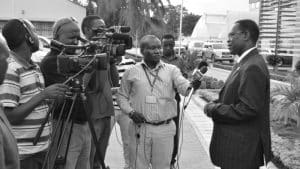Introduction to Mass Media in Tanzania
Tanzania, a vibrant East African nation, has witnessed a remarkable transformation in its mass media landscape over the past few decades. From the humble beginnings of state-controlled radio and print media, the country has evolved into a dynamic media ecosystem, where various forms of mass communication play a crucial role in shaping public opinion and driving societal change. In this article, we will delve into the intricate workings of radio, television, and print media in Tanzania, exploring their historical development, their impact on the Tanzanian society, and their enduring influence on the collective consciousness of the nation.
The History and Evolution of Mass Media in Tanzania

The history of mass media in Tanzania can be traced back to the colonial era, where the colonial administration utilized radio and print media as tools for disseminating information and maintaining control. However, the true evolution of mass media in Tanzania began in the post-independence era, as the country sought to establish its own media infrastructure and narratives. The emergence of state-owned radio and television stations, as well as the gradual liberalization of the media landscape, paved the way for a more diverse and dynamic media ecosystem.
The Role of Radio in Shaping Public Opinion in Tanzania
Radio has long been a dominant force in the Tanzanian media landscape, serving as a primary source of information and entertainment for a vast majority of the population. From its early days as a tool for government propaganda, radio has evolved into a powerful platform for public discourse, news reporting, and cultural expression. The proliferation of community radio stations, as well as the increasing reach of national radio networks, has empowered Tanzanians to engage in meaningful dialogues on issues that matter to their communities and the nation as a whole.
The Impact of Television on the Tanzanian Society
The introduction of television in Tanzania has significantly transformed the way in which Tanzanians consume and interact with mass media. Television has become a powerful medium for storytelling, news dissemination, and cultural preservation. The rise of local television stations, coupled with the growing popularity of international channels, has exposed Tanzanians to a diverse range of perspectives and narratives, shaping their worldviews and influencing their social and political attitudes.
The Influence of Print Media on Public Perception in Tanzania
While the digital revolution has brought about significant changes in the media landscape, print media continues to play a vital role in Tanzania. Newspapers, magazines, and other print publications serve as important sources of in-depth reporting, investigative journalism, and analytical commentary. The print media industry in Tanzania has weathered the challenges of the digital age, adapting to changing reader preferences and maintaining its influence in shaping public discourse and opinion.
The Challenges Faced by Mass Media in Tanzania
Despite the significant progress made in the Tanzanian media landscape, the industry faces a number of challenges that threaten its ability to operate effectively and maintain its integrity. These challenges include political interference, economic pressures, limited press freedom, and the ongoing struggle to adapt to the rapidly evolving digital landscape. Addressing these challenges will be crucial in ensuring the continued growth and influence of mass media in Tanzania.
The Future of Mass Media in Tanzania
As Tanzania continues to evolve, the future of its mass media landscape holds both promise and uncertainty. The ongoing digital transformation, the rise of social media, and the changing consumption patterns of Tanzanian audiences will all play a significant role in shaping the future of radio, television, and print media in the country. However, with the right policies, investments, and commitment to press freedom, the Tanzanian media industry can continue to thrive and fulfill its vital role in informing, educating, and empowering the nation.
Comparing the Influence of Radio, TV, and Print Media in Tanzania
When it comes to the influence of mass media in Tanzania, each medium has its own unique strengths and impact. Radio, with its widespread reach and accessibility, remains a powerful tool for grassroots communication and community engagement. Television, on the other hand, has the ability to captivate audiences with visually compelling content and narratives, shaping their perceptions and attitudes. Print media, meanwhile, continues to serve as a bastion of in-depth reporting, analysis, and opinion-shaping. While the relative influence of these media forms may vary across different demographics and regions, their collective impact on the Tanzanian public cannot be overstated.
The Importance of Media Literacy in the Tanzanian Context

As the Tanzanian media landscape continues to evolve, the need for media literacy among the population has become increasingly crucial. Equipping citizens with the skills to critically analyze and engage with mass media content is essential for fostering an informed and empowered citizenry. By promoting media literacy initiatives, Tanzania can ensure that its citizens are equipped to navigate the complexities of the modern media landscape, making informed decisions and actively participating in the shaping of their nation’s future.
Conclusion: The Lasting Legacy of Mass Media in Shaping Public Opinion in Tanzania
The power of mass media in Tanzania cannot be overstated. From the transformative role of radio in fostering community engagement to the captivating influence of television in shaping societal perceptions, and the enduring impact of print media in driving public discourse, these mediums have left an indelible mark on the Tanzanian landscape. As the country continues to evolve, the mass media industry must adapt and innovate to maintain its relevance and influence, ensuring that it remains a vital force in empowering the Tanzanian people and shaping the nation’s collective future.
For more related articles on Tanzania Media and Publishing click here!
































